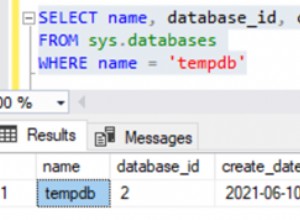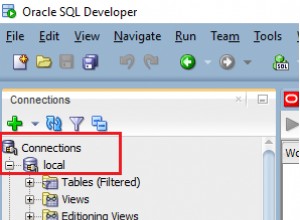Aujourd'hui, dans cet article, nous aurons une idée de la façon de surveiller la réplication MySQL. Il est aujourd'hui obligatoire de configurer la réplication dans votre environnement, mais est-ce suffisant ? Ma réponse est non'. Nous devons surveiller notre réplication de temps en temps. J'ai écrit un petit script pour surveiller notre environnement, que je vais partager avec vous pour vous rendre la vie aussi simple que la mienne.
Choses qui doivent être surveillées de votre côté esclave :
LAST_ERRNO
SECONDS_BEHIND_MASTER
IO_IS_RUNNING
SQL_IS_RUNNING
MASTER_LOG_FILE
RELAY_MASTER_LOG_FILE
Toutes ces variables font partie de "afficher l'état de l'esclave"
Enregistrez le script ci-dessous dans le fichier .sh et exécutez-le comme ci-dessous :
./mysqlhealthcheck.sh
MYSQL_CHECK=$(./mysql-uUsername -ppassword -e "SHOW VARIABLES LIKE '%version%';" || echo 1)
#echo $MYSQL_CHECK
STATUS_LINE=$(./mysql-uUsername -ppassword -e "SHOW SLAVE STATUS\G")"1"
LAST_ERRNO=$(grep "Last_Errno" <<< "$STATUS_LINE" | awk '{ print $2 }')
SECONDS_BEHIND_MASTER=$( grep "Seconds_Behind_Master" <<< "$STATUS_LINE" | awk '{ print $2 }')
IO_IS_RUNNING=$( grep "Slave_IO_Running" <<< "$STATUS_LINE" | awk '{ print $2 }')
SQL_IS_RUNNING=$(grep "Slave_SQL_Running" <<< "$STATUS_LINE" | awk '{ print $2 }')
MASTER_LOG_FILE=$(grep " Master_Log_File" <<< "$STATUS_LINE" | awk '{ print $2 }')
RELAY_MASTER_LOG_FILE=$(grep "Relay_Master_Log_File" <<< "$STATUS_LINE" | awk '{ print $2 }')
ERRORS=()
MESSAGE="NO ERROR"
bold=$(tput bold)
normal=$(tput sgr0)
echo "${bold}MYSQL_CHECK : ${normal} $MYSQL_CHECK "
echo "${bold}LAST_ERRNO : ${normal} $LAST_ERRNO "
printf "\n"
echo "${bold}SECONDS_BEHIND_MASTER : ${normal} $SECONDS_BEHIND_MASTER"
printf "\n"
echo "${bold}IO_IS_RUNNING : ${normal} $IO_IS_RUNNING"
printf "\n"
echo "${bold}SQL_IS_RUNNING : ${normal} $SQL_IS_RUNNING"
printf "\n"
echo "${bold}MASTER_LOG_FILE : ${normal} $MASTER_LOG_FILE"
printf "\n"
echo "${bold}RELAY_MASTER_LOG_FILE : ${normal} $RELAY_MASTER_LOG_FILE"
printf "\n"
### if there is an error ###
if [ "${#ERRORS[@]}" -gt 0 ]
then
MESSAGE="An error has been detected involving the mysql replciation. Below is a list of the reported errors:\n\n
$(for i in $(seq 1 ${#ERRORS[@]}) ; do echo "\t${ERRORS[$i]}\n" ; done)
Please correct this ASAP
"
echo -e $MESSAGE
else
echo -e $MESSAGE
fi SORTIE :
MYSQL_CHECK : Variable_name Value innodb_version 1.1.8 protocol_version 10 slave_type_conversions version 5.5.19-enterprise-commercial-advanced-log version_comment MySQL Enterprise Server - Advanced Edition (Commercial) version_compile_machine i686 version_compile_os linux2.6 LAST_ERRNO : 0 SECONDS_BEHIND_MASTER : 0 IO_IS_RUNNING : Yes SQL_IS_RUNNING : Yes MASTER_LOG_FILE : mysql-bin.000007 RELAY_MASTER_LOG_FILE : mysql-bin.000007 NO ERROR
vous pouvez également ajouter ce script dans vos tâches cron et vous envoyer la partie "echo -e $MESSAGE" par e-mail.




